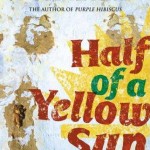Chimamanda Adichie, chronicler of our restless age of travel

Her hair is hidden in this shot but Chimamanda Adichie knows a thing or two about the political significance of black people’s hairstyles
Chimamanda Ngozi Adichie’s ‘Americanah’ is for PLUS (people like us), for anyone who has travelled away from their country of birth to live elsewhere, for square pegs in round holes. So, for tout moun (everyone) really.
Going by The Guardian review, Ms Adichie’s new book provides much to think about, many conceptual truths to recognize within oneself and others in that it deals with subjects more important than ever in an age of great mobility. As recorded in this blog before, global migration trends show that many more people live outside the country of their birth than ever before. In June 2007, the New York Times said nearly 190 million people, or about three per cent of the world’s population, lived outside their country of birth in 2005. Global migration trends mean that for an increasing number of people (and I am one of them) the chances of spending your life in the country of your birth are very low. You go where you need to go.
Sometimes, as Ms Adichie writes, you stay where you don’t really want to. And sometimes, you return to the place you left. But can you ever return? He or she who returns ‘home’ is always different from the outbound traveller, the one who left. The past is always a different country.
The Guardian describes ‘Americanah’ (Lagos slang for a fellow Nigerian, the main protagonist, who returns after an extended period in the US) as “an extremely thoughtful, subtly provocative exploration of structural inequality, of different kinds of oppression, of gender roles, of the idea of home.” Ms Adichie appears to have teased, turned over and turned on their head many politically incorrect issues – the political statement made by a black woman’s hairstyle; the way non-blacks see blacks as a homogenous group irrespective of their being Jamaican, Ghanian or African-American; how travel changes us all.
I can hardly wait to read it. She is a magnificent writer and a gentle realist.
Ms Adichie’s ‘Half of a Yellow Sun’, which fictionalizes the practically unwritten (in English) story of the short but passionate Biafran war, is one of my favourite novels. I can still remember the humiliation I felt on Olanna’s behalf when she finds out that her husband cheated on her. I remember hoping against hope that Kainene would return from her mission to trade across the enemy lines (we never do find out if she does). I remember crying over little Ugwu’s dreams.
For all that she is Nigerian, Ms Adichie is a globalista, the ideal chronicler of our restless age of travel.



